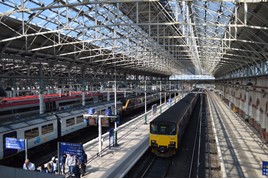“Let me be absolutely clear: passengers on these franchises are facing totally unsatisfactory levels of service.” Secretary of State for Transport Chris Grayling made this admission to the House of Commons last night (June 4) regarding the timetable situation on Northern and Govia Thameslink Railway (GTR).
Grayling added: “It is my and my department’s number one priority to make sure the industry restores reliability for passengers to an acceptable level. I want to assure the passengers affected that I share their frustration about what has happened, and that I am sorry that this has taken place.”
He said that, right now, the most important thing is to get things back to a position of stability for passengers, adding: “But it is also vital to understand what has happened and why we are in the situation we are today – and the circumstances for the failures are different on the Northern and GTR networks.”
He said investigations were being carried out, and these were providing information regarding what went wrong. “But,” Grayling said: “it is also worth being clear that the industry remained of the view until the last moment that it would be able to deliver these changes. That is the bit that everyone will find hard to understand and why there has to be a proper investigation into what has taken place.”
He said that on Northern, early analysis showed the key issue was that Network Rail (NR) did not deliver infrastructure upgrades, including the Bolton electrification scheme, on time. “This forced plans to be changed at a very late stage – requiring a complete overhaul of logistics and crew planning,” he added.
For GTR, he said that early analysis shows the industry timetable developed by NR was very late to be finalised. This meant operators didn’t have enough time to plan crew schedules or complete crew training, affecting a whole range of other complex issues that impact the service of what is an already congested service.
Grayling said: “It is also clear to me that both Northern and GTR were not sufficiently prepared to manage a timetable change of this scale either. GTR did not have enough drivers with the route knowledge required to operate the new timetable. And neither Northern nor GTR had a clear fall-back plan.”
He said of GTR: “The process of introducing the new timetable was overseen for the last two years by an Industry Readiness Board, made up of Network Rail, the Office of Rail and Road and the train operating companies and an Independent Assurance Panel.
“Both of these groups have told me that they had been given no information to suggest that the new timetable should not be implemented as planned – albeit with some likely early issues as the timetable bedded down.
“These bodies were set up specifically to ensure that all parts of the rail network – Network Rail, GTR and other train operators -were ready to implement these major timetable changes. It should have been clear to them that some key parties were not ready. They did not raise this risk.”
He said the Department for Transport received advice from the Thameslink Readiness Board that while there were challenges delivering the May 2018 timetable (namely the logistics of moving fleet and staff), a three week ‘transition’ would allow minimal disruption. Officials were assured the other mitigations in place were sufficient and reasonable, he claimed.
- Read RAIL 854, published on June 6 for in-depth analysis of the problems. Available now digitally on Android/iPad.
- Read RAIL 855, published on June 20, for the latest on this story. Available digitally on Android/iPad on June 16.
















Login to comment
Comments
No comments have been made yet.